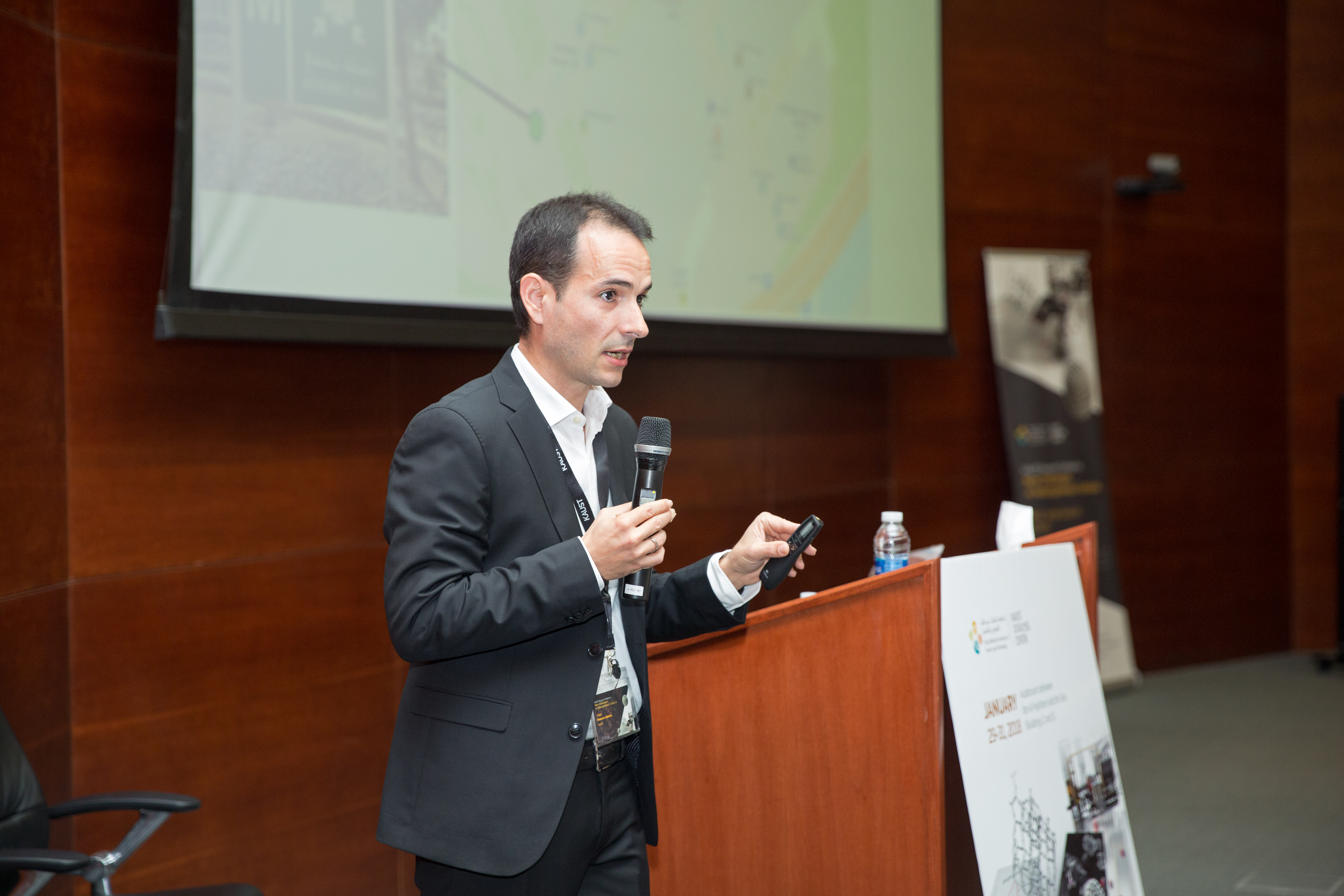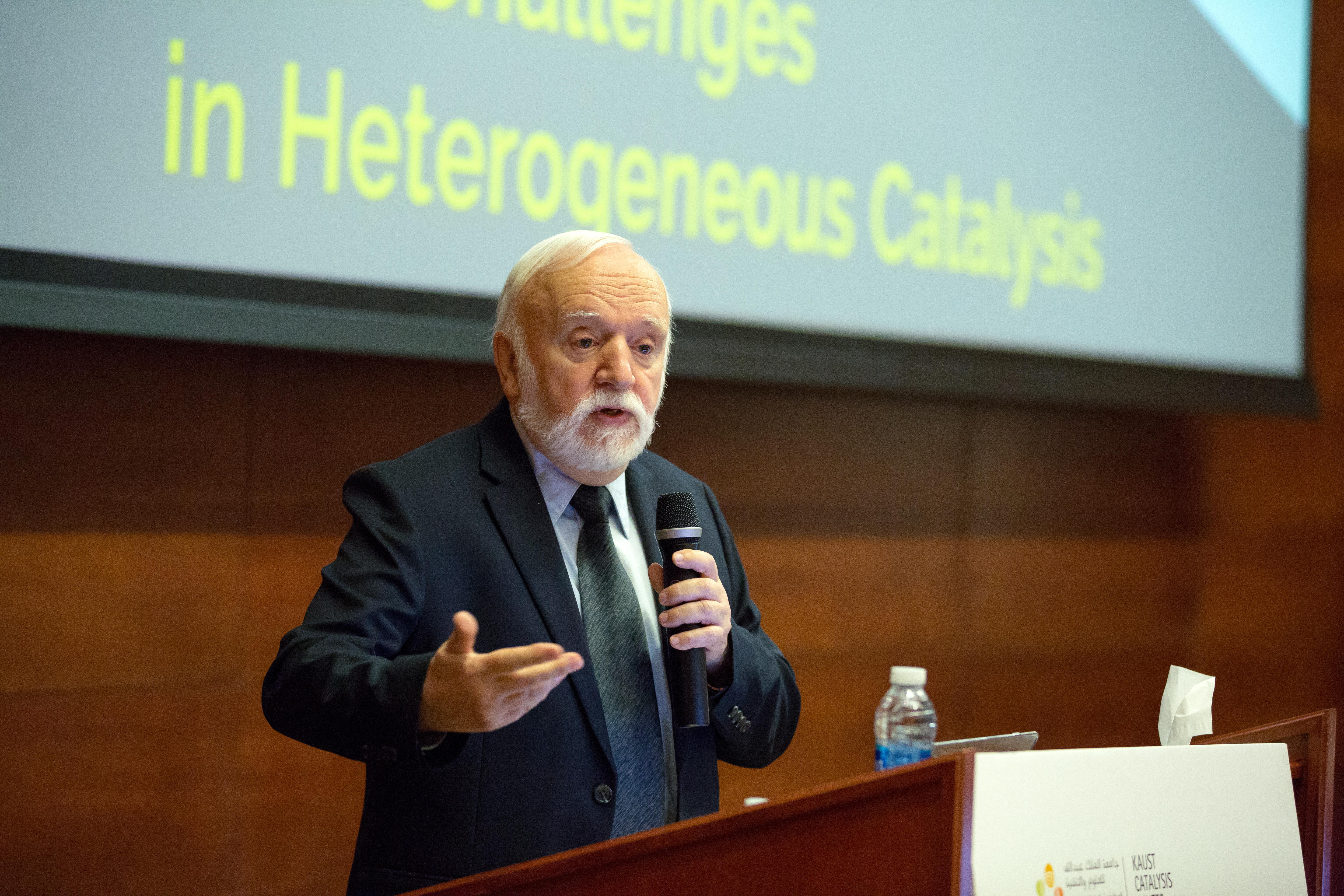A new kind of catalysis

Professor Jorge Gascon, director of the KAUST Catalysis Center (KCC), welcomes attendees to the recent KAUST New Challenges in Heterogeneous Catalysis research conference. Photo by Lilit Hovhannisyan.
-By David Murphy, KAUST News
The 1909 Nobel Prize-winning German chemist Wilhelm Ostwald once wrote that "there is probably no chemical reaction which cannot be influenced catalytically." Ostwald's words still ring through today as the production of most industrial chemicals involve catalysis. Likewise, most biochemically significant processes are catalyzed. Nowadays, catalytic processes strongly impact the industrial, agricultural and consumer sectors. Catalysts are also fundamental for a broad range of devices, including exhaust gas converters, fuel cells, sensors and water purifiers.
As an enabling science, catalysis was foundational for the agricultural revolution through the synthesis of ammonia. Over the past century, catalysis research has also been instrumental in the drive toward sustainability. Development of new catalytic processes across the chemical, petrochemical and new energies industries will increase resource and energy utilization efficiencies. Catalysis has been labeled one of the most promising tools for sustainable development and green chemistry through its focus on reducing waste and environmental impact.
Catalysis is of the utmost importance to the University's four research thrusts: food, water, energy and environment. To support the University's continued prominence in catalytic research, KAUST recently hosted the New Challenges in Heterogeneous Catalysis research conference from January 29 to 31. The conference brought together catalysis-based researchers from the University and abroad with the goal to inspire future heterogeneous catalysis research and create a discussion platform to address the main challenges that remain in heterogeneous catalysis.
An interdisciplinary discussion
The event, which was organized by Professor Jorge Gascon, director of the KAUST Catalysis Center (KCC), with financial support from the KAUST Office of Sponsored Research (OSR), featured a range of discussions focused on the development of new chemistry and catalytic materials. Other areas covered included the understanding of catalytic processes at a higher level and the activation of small molecules—specifically methane and carbon dioxide.

Jean Fréchet, distinguished professor of chemical science and senior vice president for research, KAUST Innovation and Economic Development, welcomed attendees to the conference and highlighted some of the University's goals. Photo by Lilit Hovhannisyan.
"Our University wants to continue to be a beacon of knowledge for the Kingdom. We are a small university but we look for quality and we are very focused. We stay in a few fields where we feel we can make an impact and we look for things that can be of use to this region and to this country," Fréchet said.
Professor Jeroen van Bokhoven from ETH Zurich and head of the Laboratory for Catalysis and Sustainable Chemistry at The Paul Scherrer Institute opened proceedings with a talk entitled "Methane-to-Methanol Conversion over Copper-Exchanged Zeolites." Van Bokhoven discussed the progress being made in catalytic and non-catalytic direct methane-to-methanol conversion. He identified the structural requirements to achieving high productivity and how the treatment conditions influence yield.
"There is an engineering challenge here as well as a materials challenge. We need to maximize the amount of methanol per gram of catalyst per unit of time and we need to exchange samples between laboratories," he noted.
'Enzymes are nature's catalysis'
Omar K. Farha, associate professor of chemistry at Northwestern University; distinguished adjunct professor at King Abdulaziz University; and President of NuMat Technologies, discussed functional and catalytic metal-organic frameworks (MOFs). His talk focused on new advances in the synthesis and catalytic activity of MOF materials developed at Northwestern University. Farha opened by saying that his group at Northwestern is not limited in their approach to catalysis research.
"Our group does not put all of our eggs in one basket," he said.
"Metal-organic frameworks (MOFs) are an emerging class of solid-state materials built up from metal-based nodes and organic linkers. In my opinion, MOFs are spectacular and they provide an exciting platform for deploying catalysts in a site-isolated fashion. The cavities surrounding them can be engineered to conceptually mimic enzymes, and we all know enzymes are nature's catalysts," Farha added.

Conference attendees included (from left to right): Prof. Jeroen van Bokhoven, ETH Zurich; Prof. Silvia Bordiga, University of Torino/Oslo; Distinguished Professor Nikos Hadjichristidis, KAUST; and Prof. Unni Olsbye, University of Olso. Photo by Lilit Hovhannisyan.
"Catalysis is still open to innovation. In the 21st century, catalysis is multidisciplinary—it is a key technology for the 21st century," Alshammari noted.
"The major challenge for catalysis science in the 21st century is to understand how to design catalyst structures to control catalytic activity and selectivity. The development of base metal catalysts for the synthesis of pharmaceutically relevant compounds continues an important goal of chemical research. Our team at KACST have successfully developed base-metal catalyst for the synthesis of all kinds of amines," he added.
'You mainly go from A to B'
Former KCC director and KAUST distinguished professor of chemical science Jean-Marie Basset outlined how heterogeneous catalysis is increasingly seeking and refining strategies to render itself more predictable. Basset, who has authored over 500 scientific papers and reports, described his field of research, surface organometallic chemistry (SOMC).
"During the catalysis process you make bonds or you break bonds. With catalysis you go mainly from A to B—you make bonds based on molecular chemistry," Basset said.
"There is not much of a difference between single-atom chemistry and SOMC. Single-site, well-defined heterogeneous catalysts can be prepared using surface organometallic chemistry. Because we have a well-defined material, we understand the process," he added.
Basset finished his talk by praising the KCC and its work, noting, "At the KCC, we are a team, and there is no competition between us—I am proud of our team and center."
An environmental problem-solving approach
Kuo-Wei Huang, associate professor of chemical science at KAUST, emphasized the harmful role CO2 plays as a greenhouse gas in our environment in his talk entitled "Fueling the Future." He outlined his group's catalysis research, which aims to reduce harmful CO2 emissions.
"Globally, the burning of carbon-based fossil fuels supplies over 81 percent of the energy demand, and in 2013, the estimated world population of 7.14 billion people consumed 13.6 GTOE of energy. In the future, our population is going to increase and we're going to consume more energy. I believe our energy consumption will be at least double. Do we have new sources of energy or new fossil fuels to burn?" Huang questioned.
"We need to develop carbon-neutral energy and solar energy...The ideal place to set up solar farms and solar panels is in the desert—KAUST is very rich in research potential," he added.
In his talk entitled "Catalysis research for CO2 utilization: An industrial approach," Dr. Daniel Curulla Ferré of Total S.A. outlined Total's activities and strategy in CO2 capture, storage and utilization (CCSU). He also covered the pros and the cons of one of the high-potential routes for CO2 utilization through the production of organic carbonates. Curulla Ferré outlined how industry and academia have to come together to solve future energy problems.

Conference attendees included Distinguished Professor Nikos Hadjichristidis from the KAUST Catalysis Center (KCC) and Yves Gnanou, distinguished professor of chemical science and dean of the Physical Science and Engineering Division. Photo by Lilit Hovhannisyan.
"At Total, we feel the solution is carbon capture and storage (CCS). For years, we have been working with CO2 in industry. CO2-based technologies for the production of organic carbonates show high potential; however, CO2 utilization technologies need to be cost-competitive to be implemented. Life cycle analysis in the early stages is crucial to set research goals and identify hotspots," he added.
Closing remarks
The event concluded with closing remarks from Gascon and the announcement of the student poster session winners. The poster session was open to students and postdoctoral fellows from KAUST and abroad. The top three poster award winners were: Amani Alghamdi of King Abdulaziz University; Baraa Werghi of KAUST; and Jingyun Ye of the University of Minnesota.
Gascon rounded out the event by thanking all of those who attended and helped to the make the conference a success.
"I hope you all enjoyed the conference and I would like to thank you for being here. For those who visited KAUST for the first time, I hope you will go on to be ambassadors for our University," he said.
Related stories:
- Designing the perfect surface catalyst
- Jorge Gascon Appointed Director Of KAUST Catalysis Center
- Fixing a greenhouse gas for useful chemicals
- Catalysis with a light touch
- Catalytic teamwork transforms propane
-
Combining polymer expertise

